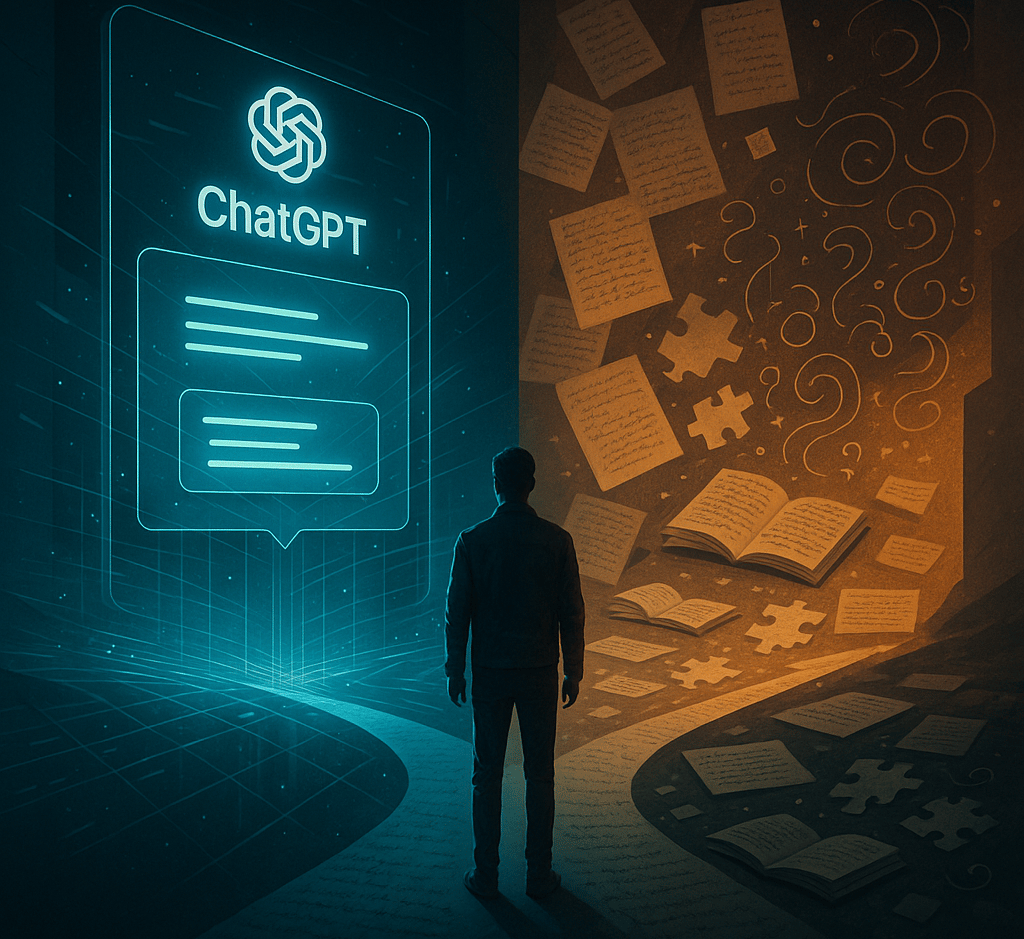Could AI Weaken Critical Thinking?
MIT study finds that using AI like ChatGPT reduces brain activity, critical thinking, and memory, leading to superficial work and long-term cognitive decline, raising concerns over educational and societal impacts.
LLMARTIFICIAL INTELLIGENCETECHNOLOGY
Eric Sanders
7/6/20255 min read


When AI Does the Thinking for Us: The Hidden Cognitive Costs of Relying on ChatGPT
In an era where artificial intelligence tools like ChatGPT have become a low-cost and open availability helper for everything from drafting emails to essay writing, I think it's easy to assume we’re simply boosting productivity and creativity with little to no downsides. A new study recently published from MIT challenges this fairytale narrative. Their research suggested to me that leaning too heavily on AI for our thinking tasks could be casuing our critical thinking skills to diminish. Their research concluded with thoughts that our brain’s ability to engage in critical thinking has measurably decreased, show signs of lowering memory retention, and ultimately reducing cognitive function over time. But just how much is this really affecting us?
Seeing Both Sides of AI Assistance
Every tool changes the way we work, how we create, and how we explore, but few recent developments feel as intimate (or potentially as invasive). The tools have evolved faster and more innovative that previously seen. We have AI that talks back in fluent languages with ease. ChatGPT and similar models have democratized access to information and writing assistance, empowering so many of us to generate content faster than ever, conduct research in fractions of time we use to spend. However, the MIT study purposed that this convenience we rarely give a second thought to could come at a hidden cost to our mental state, potentially altering our abilities to think.
Researchers observed participants engaging in writing tasks, both with and without AI assistance and when test subjects were using ChatGPT, participants demonstrated the following:
- Marked reductions in brain activity related to critical thinking and problem-solving.
- Poor recall and weaker memory formation of the material they produced.
- A tendency to produce superficial work, relying on AI-generated answers rather than internal reasoning or synthesis related to problem solving.
My takeaway? Well, maybe us offloading the thinking to AI models isn’t just about outsourcing our busywork, it appears to shortcut the neural pathways that make deep learning and long-term retention even possible for us.
Utilizing AI Beyond Academia Life
I think it's tempting to view these findings through a narrow academic lens, we have students who turn in papers without fully grappling with concepts, or classrooms who use to test their students to the best of their abilities losing their rigor, and grades continue to decline in what a student represents as far as their thinking abilities. So it had me thinking, "What if the implications stretch beyond peoples time in school? How do students or even current people who are matured in their careers function when the ability to utilize AI are not as accessible as it was while in their previous environments?
As a society, I feel that when we outsource reflective thinking and critical analysis to algorithms or Ai generated answers, we end up with several unsettling patterns that are beginning to emerge:
- Erosion of problem-solving skills: In professional settings, quick AI-generated answers may discourage nuanced judgment or innovation.
- Diminished mental resilience: Just like muscles weaken without exercise, the brain may atrophy when chronically underutilized.
- Amplification of misinformation risks: Relying on AI without scrutiny can propagate errors, biases, or superficial understanding.
The MIT study authoritatively summed it up for me: The use of AI tools could lead to a potential cognitive shortcut for us, enabling quick and fairly reasonable outputs however, at the same time it's inhibiting authentic engagement and digestion with material for personal growth, and problem solving skills critical for forming our long term mental skills we rely when the smoke clears and we're left with nothing but ourselves and the skills we've accumulated to at this point.
AI and Our Critical Thinking Brains
I have to admit, I've been both a major skeptic and an eager adopter (often first in line for testing) of AI tools throughout my career so far. On one side, I see tools like ChatGPT offering an unmatched efficiency and ability to be more self reliant. On the other though, I’ve felt firsthand the subtle dulling of mental sharpness when I skip the effort of wrestling with difficult questions or drafting my own critical thoughts for a larger project. For me, there's a strange satisfaction in watching AI churn out flawless paragraphs in seconds, or generate stunning images with nothing but some engineered prompting, but is my satisfaction causing me to turn a blind eye to something more sinister? Am I truly learning anything from offloading this task to AI? Or am I just recycling some artificially generated mumbo jumbo information without actually anchoring it in my own thinking to increase my mental fortitude? Am I becoming complacent with a mindset of eh, good enough...?
After reading the MIT research, I concluded that maybe it's not a doom-and-gloom rejection or acceptance of AI, but rather a reminder for me to seek balance and have some recognition that cognitive effort is not always considered a wasted effort.
How to Harness AI Without Losing Your Mind
So what can I do knowing this? Well, we don’t have to reject AI to preserve all of our cognitive capacities i think. Instead maybe we focus on adopting mindful strategies in our AI usage and how it can help retain and even enhance our thinking abilities:
- Use AI as a collaborator, not a crutch.
Start with your own ideas or drafts, then turn to AI to refine or expand, rather than create from scratch.
- Engage critically with AI output.
Question, verify, and challenge the responses rather than accepting them at face value.
- Practice active recall and reflection.
After using AI, summarize what you’ve learned or pose questions to deepen understanding.
- Limit reliance during learning or crucial problem-solving moments.
Protect “thinking time” where your brain does the heavy lifting without shortcuts.
- Combine AI usage with deliberate mental exercises.
Like puzzles, discussions, or writing freely to keep neural pathways active.
For me, I think these approaches allow me to acknowledge that AI has undeniable benefits and also provide me a way to safeguard the very brain functions that underpin my creativity and personal insight.
What’s at Stake If I Don’t Adjust?
I try to Imagine a future classroom where ChatGPT is drafting every single essay, or my workplace where coworkers are routinely accepting AI’s surface-level analyses. The short-term gains for us could turn into a cognitive deficit and create a workforce and citizenry less apt to thinking deeply, critically, or creatively.
Who Will Champion Human Thinking?
The MIT study had me confront a fundamental question: in a world where AI can think and do for us, what role will our own personal minds play? Our brains are not machines to be replaced or bypassed with the advancement of technology, they're organs shaped by exercise, challenge, and endless curiosity. It's evident AI can accelerate information access among other endless possibilities, but it cannot replicate the transformative power of human insight that has been forged through struggle and deep self reflection.
Will we will step up to ensure that our education systems, workplaces, and work ethic put more significant value on mental effort as much as convenience? How do think we will integrate AI without having to sacrifice intellectual growth and resilience?
These are the questions that matter now more than ever to me. If we lose our capacity to think critically and remember deeply, what remains uniquely human in the digital age? How do we ensure that continue to put the human element in our world?
Efficiency
Transform your workflows and reclaim your time.
Contact Us
Need A Custom Solutions? Lets connect!
eric.sanders@thedigiadvantagepro.com
772-228-1085
© 2025. All rights reserved.
